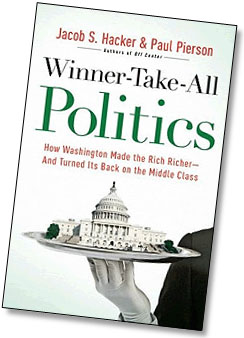
Image from <a href="http://www.amazon.com/Winner-Take-All-Politics-Washington-Richer---Turned/dp/1416588698/ref=sr_1_6?s=books&ie=UTF8&qid=1283917611&sr=1-6">Winner-Take-All Politics</a>
Why has income inequality grown so explosively over the past 30 years? Why do so many working and middle class voters cast their ballots for a party that’s so obviously a captive of corporations and the rich? Why is there no longer any real sustained effort to improve the lot of the middle class?
There’s no shortage of answers. There’s the “What’s the Matter With Kansas” theory. There’s the demise of labor unions. There’s the well-worn story of the rise of conservative think tanks. There’s the impact of globalization on unskilled and semi-skilled labor. There’s the growing returns to education in a world that grows more complex every year.
But these are all limited and therefore unsatisfactory explanations, and no one has yet put them all together into a single organic whole that feels genuinely complete and compelling. Until now. The book that finally does it is called Winner-Take-All Politics, by Jacob Hacker and Paul Pierson, and it puts together all of these pieces with a clarity of explanation that’s breathtaking. I hesitate to summarize their argument for fear of ruining it, but here’s the nickel version:
- In the 60s, at the same time that labor unions begin to decline, liberal money and energy starts to flow strongly toward “postmaterialist” issues: civil rights, feminism, environmentalism, gay rights, etc. These
 are the famous “interest groups” that take over the Democratic Party during the subsequent decades.
are the famous “interest groups” that take over the Democratic Party during the subsequent decades. - At about the same time, business interests take stock of the country’s anti-corporate mood and begin to pool their resources to push for generic pro-business policies in a way they never had before. Conservative think tanks start to press a business-friendly agenda and organizations like the Chamber of Commerce start to fundraise on an unprecedented scale. This level of persistent, organizational energy is something new.
- Unions, already in decline, are the particular focus of business animus. As they decline, they leave a vacuum. There’s no other nationwide organization dedicated to persistently fighting for middle class economic issues and no other nationwide organization that’s able to routinely mobilize working class voters to support or oppose specific federal policies. (In both items #2 and #3, note the focus on persistent organizational pressure. This is key.)
- With unions in decline and political campaigns becoming ever more expensive, Democrats eventually decide they need to become more business friendly as well. This is a vicious circle: the more unions decline, the more that Democrats turn to corporate funding to survive. There is, in the end, simply no one left who’s fighting for middle class economic issues in a sustained and organized way. Conversely, there are lots of extremely well-funded and determined organizations fighting for the interests of corporations and the rich.
The result is exactly what you’d expect. With liberal money and energy focused mostly on non-economic concerns, the country moves steadily leftward on social issues. With conservative money and energy focused mostly on the interests of corporations and the rich—and with no one really fighting back—the country moves steadily rightward on econonomic issues. Thomas Frank’s famous working-class Kansans who vote against their own economic interests are easily explained. It’s not just that conservatives appeal to them on social grounds, it’s that there’s no one left to really make the economic case to them in the first place. And even if anyone did, they have little reason to believe that Democrats would actually follow through in concrete ways. So why not vote on abortion and gay rights instead?
I’m not doing Pierson and Hacker justice here. In fact, I’m not really even trying to. What I am doing is telling you to buy a copy of their book and read it. Seriously. Just get a copy and read at least Parts I and II. No book is perfect, and I feel a little silly gushing too much, but this is the most complete and sustained explanation I’ve ever read of why, over the past 30 years, America has gone the direction it has even while most other countries haven’t. And although Hacker and Pierson’s sympathies are obvious, this isn’t a polemic. It’s an explanation. For me, it was a 300-page “Aha!” moment.
More later. In the meantime, though, buy the book. I can almost guarantee you won’t be disappointed.
















